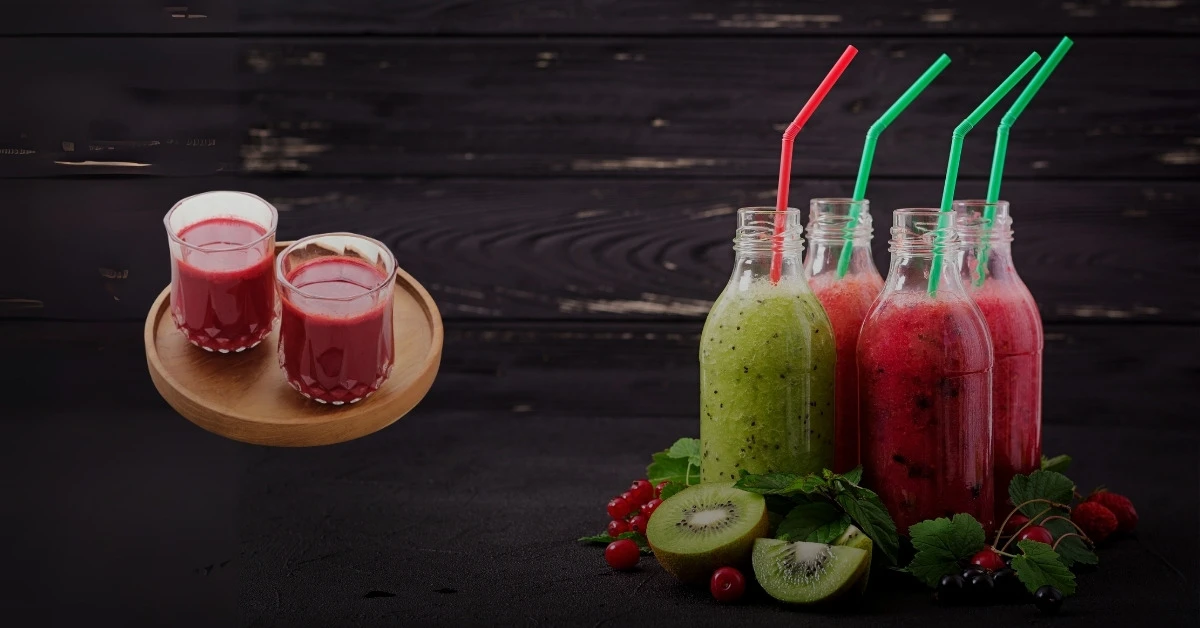Cold-pressed juice has gained popularity in recent years as a purportedly healthier alternative to traditional juices. Unlike conventional juicing methods that involve high-speed blending or centrifugal force, cold-pressed juice is made by hydraulic pressing fruits and vegetables to extract their liquid without generating heat.
Nutritionists often suggest incorporating cold-pressed juice into a balanced diet as a convenient way to boost fruit and vegetable intake, providing essential vitamins, minerals, and antioxidants that support overall health and well-being.
However, it’s important to consume cold-pressed juice in moderation and not as a replacement for whole fruits and vegetables, as the juicing process removes fiber, which is crucial for digestive health and helps regulate blood sugar levels.
Understanding Cold-Pressed Juice?
Cold-pressed juice is not just a tasty beverage; it’s a powerhouse of nutrients that our bodies can readily absorb. Unlike traditional juices that may lose some nutritional value due to heat exposure during the juicing process, cold-pressed juice retains more vitamins, minerals, and enzymes thanks to its gentle extraction method.
This makes it not only easy to digest but also provides a swift delivery of essential nutrients for our bodies to utilize effectively. Whether you are looking to support your immune system, reduce inflammation, aid digestion, or promote healthy hair.
Additionally, cold pressed juice boosts energy levels and offers a convenient and delicious way to nourish your body from the inside out.
- Packed with a wide array of nutrients and minerals
- Supports the immune system
- Reduces inflammation
- Aids digestion
- Promotes healthy hair
- Boosts energy levels
What Experts Say – Is Pressed Juice Healthy?
The question on many minds is, “Are cold-pressed juices healthy?” According to nutrition experts, the answer is a resounding yes, with a caveat. Cold-pressed juices are indeed packed with essential nutrients, enzymes, and antioxidants, making them a valuable addition to a balanced diet.
The gentle extraction process preserves the integrity of these nutrients, ensuring that you get the maximum health benefits with every sip. However, it’s crucial to remember that while cold-pressed juices offer a convenient way to increase your fruit and vegetable intake, they shouldn’t replace whole fruits and vegetables in your diet entirely.
Potential Benefits:

- Nutrient Rich: Cold-pressed juices can be concentrated sources of vitamins, minerals, and antioxidants, which can support overall health.
- Convenience: Pressed juice provides an easy way to consume fruits and vegetables, especially for people who struggle with eating enough servings.
- Digestive Support: Some proponents claim juices can aid digestion, though the evidence is limited.

- High Sugar Content: Juicing removes fiber, leaving concentrated sugars that can spike blood sugar and contribute to weight gain. Moderation is key.
- Limited Fiber: Fiber promotes gut health, regulates blood sugar, and provides satiety. Juicing removes most fiber, reducing these benefits.
- Exaggerated Claims: Claims about detoxification, disease prevention, or weight loss through juicing often lack strong scientific evidence.
- Cost: Cold-pressed juices can be expensive compared to whole fruits and vegetables.
What do nutritionists think? Is Pressed Juice Good for You?
Pressed juice can indeed provide a concentrated source of vitamins, minerals, and antioxidants from fruits and vegetables, whether it’s “good” for you depends on various factors. Cold-pressed juices can be a convenient way to boost your nutrient intake and hydrate your body, especially for those who struggle to consume enough fruits and vegetables in their diet.
However, it’s essential to consume pressed juice in moderation and not as a replacement for whole fruits and vegetables. Whole fruits and vegetables contain essential dietary fiber that aids in digestion and helps regulate blood sugar levels, which can be lacking in pressed juice.
Additionally, some commercially available pressed juices may contain added sugars or lack the fiber and nutrients found in whole produce. Therefore, while pressed juice can be a part of a healthy diet when consumed mindfully, it’s essential to prioritize whole, unprocessed foods for optimal health and nutrition.
Benefits of Cold Pressed Juice
Cold-pressed juice offers a plethora of benefits that can enhance your overall health and well-being. By harnessing the natural goodness of fruits and vegetables through a gentle extraction process, cold-pressed juice provides a concentrated source of essential nutrients, enzymes, and antioxidants.
Here are some of the key benefits:

Nutrient-Rich: Cold-pressed juice retains more vitamins, minerals, and enzymes compared to traditional juicing methods, ensuring you get a potent dose of nutrients with every sip.
Hydration: Incorporating cold-pressed juice into your daily routine helps keep you hydrated, supporting various bodily functions and promoting overall health.
Antioxidant Boost: The high antioxidant content in cold-pressed juice helps combat oxidative stress, reducing the risk of chronic diseases and supporting cellular health.
Digestive Support: Cold-pressed juice can aid digestion thanks to its natural enzymes and fiber content, promoting gut health and regularity.
Immune System Support: The vitamins and minerals in cold-pressed juice, such as vitamin C and zinc, help strengthen the immune system, keeping you resilient against infections and illnesses.
Detoxification: Cold-pressed juice can support the body’s natural detoxification processes, helping to eliminate toxins and promote a clean, healthy system.
These benefits make cold-pressed juice a convenient and delicious way to nourish your body and enhance your overall health and vitality.
6 Ways to Maximize Your Cold-Pressed Juice Nutrition Intake
While cold-pressed juice can be a convenient way to get a quick burst of nutrients, it’s important to remember that it shouldn’t replace whole fruits and vegetables in your diet. Here are 6 ways to maximize your cold-pressed juice nutrition intake:
Choose high-quality ingredients: Opt for juices made with fresh, organic fruits and vegetables whenever possible. Avoid juices with added sugars, artificial flavors, or preservatives.
Go green: Include plenty of leafy green vegetables in your juice blends. Leafy greens are packed with vitamins, minerals, and antioxidants.
Add healthy fats: Including a source of healthy fats, such as avocado or nut butter, can help slow down the absorption of sugar and increase satiety.
Keep it small: Aim for no more than 4-6 ounces of juice per serving. Remember, juice is still concentrated in sugar, even without added sugars.
Pair with whole foods: Enjoy your juice alongside a balanced meal or snack that includes protein, fiber, and healthy fats. This will help you feel fuller and more satisfied.
Make it at home: If you have the time and equipment, consider making your own cold-pressed juice at home. This gives you complete control over the ingredients and portion sizes.
Why Are Cold Pressed Juices Better from Others?
However, they also lack While cold-pressed juices have gained popularity for their nutrient content, it’s important to understand that they’re not inherently “better” than other juices. They offer certain advantages like minimal heat exposure, potentially preserving more vitamins and enzymes, and a concentrated dose of nutrients.
the crucial fiber found in whole fruits and vegetables, leading to higher sugar content and less satiety. Ultimately, the best type of juice depends on your individual needs and dietary goals.
| Aspect |
Cold-Pressed Juice |
Other Juices |
| Extraction Method |
Hydraulic pressing without heat |
High-speed blending or centrifugal force |
| Nutrient Preservation |
Retains more vitamins, minerals, and enzymes |
May lose some nutrients due to heat exposure |
| Antioxidant Content |
Higher concentration |
Varied, depending on processing methods |
| Fiber Content |
Lower (due to extraction method) |
Higher (if whole fruits and vegetables are used) |
| Shelf Life |
Shorter shelf life due to minimal processing |
Longer shelf life due to preservatives and pasteurization |
How to Get Fiber With Your Cold-Pressed Juice?
Due to the juicing process itself, it’s impossible to directly add fiber back into cold-pressed juice. Fiber is part of the plant cell walls, which are typically discarded during juicing to extract the liquid.
However, there are still ways to incorporate fiber into your diet alongside your cold-pressed juice to enjoy the benefits of both:
- Pair your juice with fiber-rich foods:Have your juice as part of a balanced meal or snack that includes whole fruits and vegetables like berries, apples, pears, or celery sticks. These will provide natural fiber and keep you feeling fuller for longer.Add chia seeds, flaxseeds, or even a scoop of psyllium husk powder to your juice after blending. These soluble fiber sources won’t affect the taste significantly and can aid digestion. Blend whole fruits and vegetables, like carrots, beets, or leafy greens, into your juice alongside fruits. This retains some of the pulp and fiber content compared to traditional juicing.
- Focus on high-fiber fruits and vegetables:When choosing ingredients for your juice, prioritize those naturally higher in fiber such as apples, berries, pears, bananas (with skin), and leafy green vegetables like kale, spinach, and collard greens.Consider including pulp in your juice, although it may affect the texture. Pulp contains some insoluble fiber, beneficial for gut health.
- Supplement your diet with fiber:If you find it challenging to meet your daily fiber intake through diet alone, consider taking a fiber supplement like psyllium husk or Metamucil. However, consult a healthcare professional before starting any supplement.
Let’s Recap
Cold-pressed juice offers a multitude of health benefits, serving as a convenient and delicious way to boost your nutrient intake and support overall well-being. Through its gentle extraction method, cold-pressed juice retains more vitamins, minerals, and antioxidants compared to traditional juicing methods.
While it’s essential to enjoy cold-pressed juice in moderation and not as a replacement for whole fruits and vegetables, incorporating it into your diet can provide hydration, digestive support, immune system boost, and detoxification benefits.

















